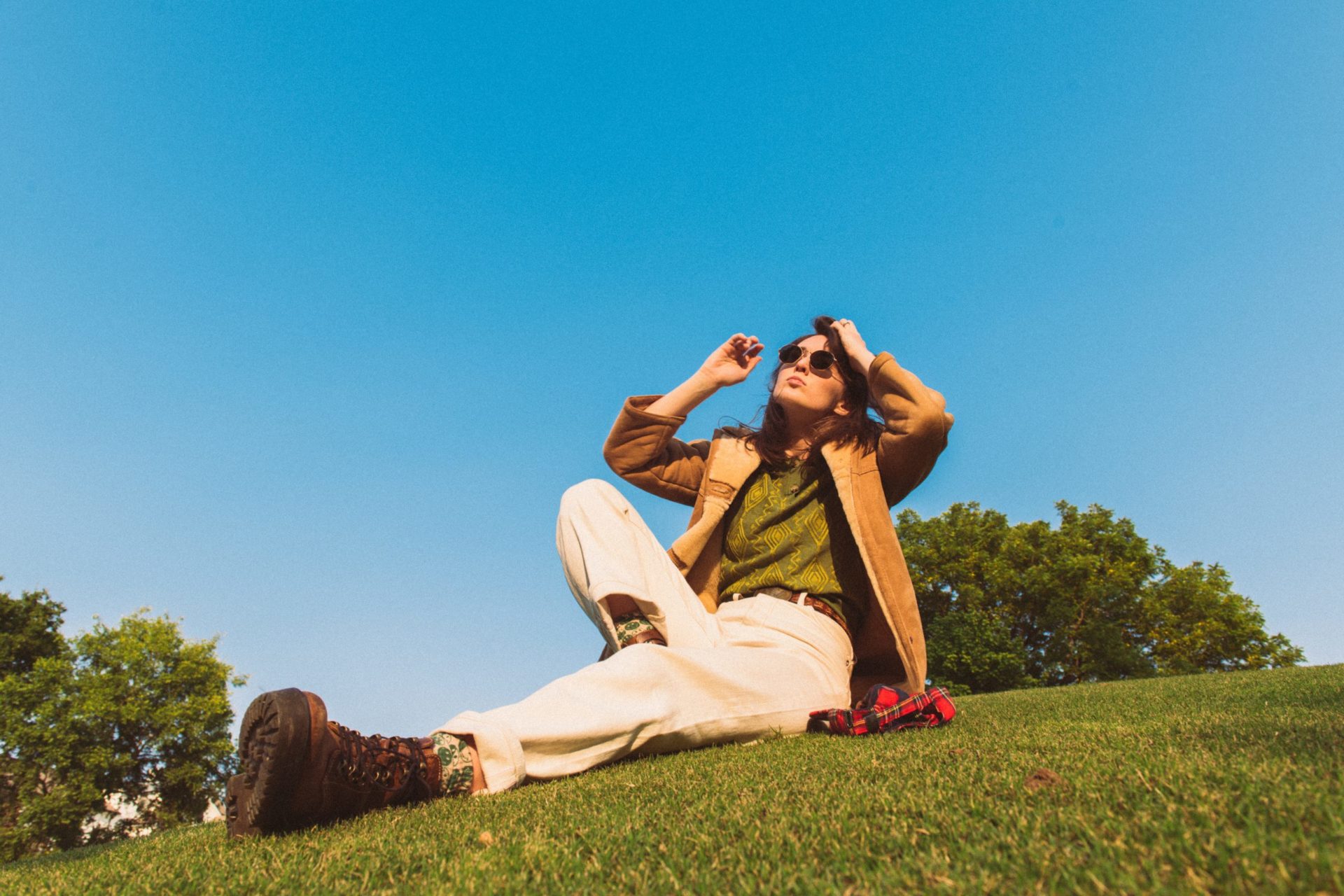On her 2016 single “Who Could Love”, Laney Jones sings, “I’m not the person I used to be,” a line that serves as a portent for an artist whose first two records– Beyond the Blue (2012) and Golden Road (2013)– are defined by their neo-traditionalist sensibilities. Her horizons began to widen with her third record, Laney Jones (2016), where she takes gentle steps away from the coffee houses and into the wilderness of unapologetic exploration.
Jones’s latest record, Stories Up High, is her coming-out party, a document of an artist reborn. There are still the inescapable rustic underpinnings– the acoustic guitar, the languid open-field sway, the faint twang of her voice– but here, the studio itself has become as sacred as her banjo. She recorded much of the album at Nashville’s now-institutional Bomb Shelter, with producer Andrija Tokic (Hurray for the Riff Raff, Alabama Shakes, The Ettes, Ian Noe, Langhorne Slim) helping her craft a set of neon-embellished torch songs that evoke a long night of shuffling back and forth between Lana Del Ray and Wilco records. Behind the wistful melodies of the title track, the crushing “Memory”, and the haunting finale “If Life Is” are backgrounds full of hums, swells, whirls, and flourishes that somehow afford the songs both an icy detachment and a this-is-all-that-matters-in-the-world sincerity.
Laney Jones celebrates the release of Stories Up High on Thursday, May 12 at Grant’s Lounge.
Your previous record [Laney Jones] came out in 2016. What were you up to between releases?
I took a little bit to work on this record. Also, the pandemic slowed things down a little bit, but it was really just a great excuse to dive deeper into the art of recording. Then also too, during the whole period between my last record and this record, I moved to Nashville. I got married. I also have a side project that I rap on called KOYOTIE. That’s done really well as far as in the world of placement and licensing. I’m a full-time musician and writer. I’ve been expanding my musical horizons, so I can be that sort of musician and be able to sustain and support myself at the same time too.
A lot’s happened since 2016, like the pandemic and political and social upheaval. Did that turmoil and unrest propel you back into action, to end your hiatus?
I feel like I felt downtrodden for the past few years, like everybody else in some way. I wasn’t writing for anyone but myself, and I think that there are these feelings that I was articulating that I felt that I needed to hear. I think that even the smallest voices really have something to say; usually, those who don’t speak up or who hurt the most are the ones who are saying something that needs to be heard. I felt like it’s my time to be heard a little bit more and maybe some of these things I’ve been telling myself, but not necessarily would have been taken to heart, it would be good to get out there and share with people, and it might mean something to somebody else. I think it seems like it has been so far. Some people have really connected to it, so that’s exciting. And it feeds the soul.
With this record, the vibe is experimental, layered, and atmospheric. You seem to be drifting further from the more traditional sounds of your earlier records. How do you account for that evolution?
I think it’s just jamming and growing as a musician. I started playing and writing when I was in college, but it was just me and a ukulele or banjo. I come from a small town that’s just right outside of Orlando, but where I really got my start was at these old foggy cafes and coffee shops where they would sing old folk songs. I was writing for those people in that period of my life. I didn’t grow up in bands or anything like that. My husband [Brian Dowd] is my drummer, and we’ve made our own studio down in our basement. We jam all the time; we have friends come over and jam. I’ve worked with so many different producers now through working on my pop stuff, but I think I’ve always been drawn to that lo-fi, swirly psychedelic stuff. I just didn’t know how to make it or create it. I’ve seen my evolution in real-time with me just learning stuff.
Can you pinpoint a song or a moment in the creative process when you realized you were in uncharted territory, that you were doing something new?
I feel like with my last record, I really did get to experiment more in the studio, which is cool. But on the one before that, I was really a real new musician; I had only been playing music for five years, so I wasn’t able to– even though I was writing the songs– contribute musically as much, even just with the people that I was working with around me. But this time around, it was such a cool and different unique experience. I was working with some of my musical heroes. I really love Hurray for the Riff Raff and Langhorne Slim, and the studio that I predominantly worked out of in Nashville– The Bomb Shelter— we had made records there with some of the same musicians that played on their records, too. I felt this huge confidence and validation from working with these people who had made some of my favorite records, and they’re being like, “Yo, you got something.” Even the little riff lines that I came up with, it was such a more open dialogue and atmosphere where I thought, “This feels different to me. I feel like more of a complete musician and person.” It feels most like myself than I ever had, you know?
To me, the coolest thing about this record– and it’s still just so validating– a couple of the songs from the record, “One Fine Morning” and “Long Way”, me and Brian produced at our house. Brian played bass and percussion, and I played all the other weird stuff on it. We got some help with the mixing, but we really dove into the production world, finding cool plugins and working on the reverb, figuring out the sound on my own, getting weird, you know? For those songs to sit alongside the songs that were created in this world-class studio on tape, it’s an exciting and freeing experience for my own self. Ten years ago, it felt so foreign and scary. I didn’t come from a musical family or punk rock or garage bands in high school. It feels like I’m a whole different person, and it’s exciting. I’m really into the DIY thing these days. I want to make it a show, an experience for everyone.

Did you have concerns about alienating your fanbase or genre purists?
Oh man, I think it was more for my last record because that had some more rock elements. But the thing is, I’m a writer. Truly, I think that’s my one gift. I’m not the best musician; I’m not the best singer. I think I’ve been working on those for a while now, but the thing that always came naturally to me was writing, so I’m just following the muse. You can’t try to control it or shut it off or try to dictate it, or else it’s just going to turn to somebody else.
It’s like Tom Waits talking to [Elizabeth Gilbert] who wrote Eat, Pray, Love– really, all creativity is just like these spirits that are above, hanging around everywhere, and people are the little umbrellas or little antennas that are picking up the lightning, like a lightning rod. I really do believe that. It’s a very humbling thing, too. It’s not me that’s making up all this shit. A lot of times, I just picked stuff out, and it’s crazy how things are just born that way.
So I would say, no, I’m not scared of alienating anybody because it is what it is. I’m going to just try to keep making the best stuff I can.
You’ve said, this record is “a response to your mental health struggles during the pandemic.” Was it difficult confronting those struggles? Coming to grips with your issues in a public forum?
I was writing for myself before I was writing for anybody else. It was a real form of therapy, and it sounds funny, but sometimes I would even cry while writing some of the songs, as far as deep realization for my own self. The song “Rocket to Mars,” to me, the lyrics, I don’t know why I was writing it. I was finding that place of spirituality and how there’s nothing to fear, in a sense, because everything is continuing on, like with Einstein’s theory that the universe keeps expanding and time keeps happening, so it never really ends. I think that’s a theme throughout this record. I think it’s me embracing that change and trying to understand my place in life.
What are some of your favorite records where artists have given themselves over to vulnerability, bared their souls?
One of the records that got me into The Bomb Shelter that I thought was really cool was Hurray for the Riff Raff’s Look Out Mama. I think that’s a great record. Funny enough, they weren’t even signed or anything for that record. Then, obviously, there’s the classic stuff. I really love Neil Young’s On the Beach. He was doing some honey slides [sauteed honey and marijuana] during the recording that made it super mellow. I mean, all The Beatles stuff. I love Nina Simone’s Pastel Blues– it’s such a freaking great record! I really just love records that speak to life and have some sort of philosophical merit. I love studying philosophers and thoughts and making sense of life and understanding. That’s what art is all about, and my medium is music.
